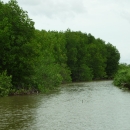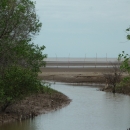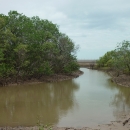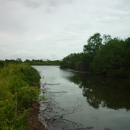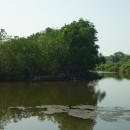Grants :: Small Grant Facilities :: Community forestry management and improving mangrove based poly-culture model in Ba Tri District, Ben Tre Province
Community forestry management and improving mangrove based poly-culture model in Ba Tri District, Ben Tre Province
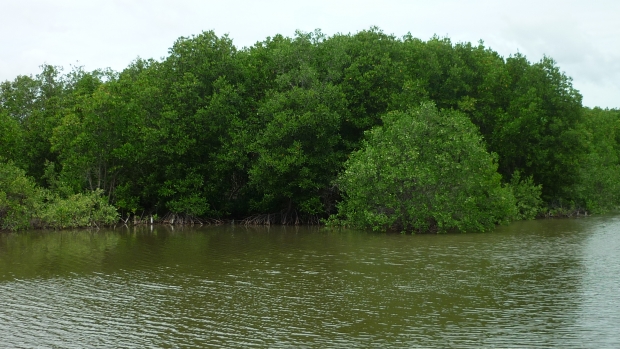
Shrimp mangrove polyculture at An Thuy Commune, Ba Tri Distr ... , Ba Tri District, Ben Tre Province © Ben Tre Forest Protection Unit , 2013
Objectives
Original title is: Improving mangrove based-polyculture model through community participation in Ba Tri District, Ben Tre Province
The project aims to improve and increase the efficiency of polyculture practices in mangrove forests through the development of a "Regulation on forest protection and production - combining polyculture with mangroves in a sustainable way” in An Thuy Commune, Ba Tri District, Ben Tre Province.
Background
There are currently no aquaculture activities within the project site and as such there is very little knowledge of aquaculture techniques within the community. Farmers either collect seeds from nature or buy cheap, unguaranteed seeds. Water quality is poor and there is no drainage, water supply channels, or water treatment measures. Farming methods are inefficient and epidemic disease is common; thus, productivity remains low.
Target beneficiaries
- Twenty low income households
- Community in An Thuy Commune Ba Tri District, Ben Tre Province
Outputs
- A 30-50% increase in productivity and economic efficiency
- Improve mangrove protection
- Improve water quality
- Regulation of forest protection and mangrove-aquaculture production is developed at An Thuy Commune, Ba Tri District, Ben Tre
Accomplishments and challenges
Raising awareness of local people about the role of mangrove forests in environmental protection and ecological relationship between "shrimp and forest trees" has contributed to terminating the continued felling of mangroves by local people for shrimp farming area.
Local people have grasped improved extensive shrimp farming techniques; disease-free seeds were further stocked into ponds and marine species in farming ponds were diversified.
The project has gathered individual aquaculture households into groups. Groups had a meeting once a month with regulations adopted, and thereby bringing into full play the power of community in improving the environment for aquaculture, and implementing activities for the protection and development of forests.
The project has changed the perception of participating households about the tremendous value of the mangroves and surrounding environment toward aquaculture, and thus meet the objectives: i) Mangroves in the project area are better protected and developed. People voluntarily plant additional mangroves on the open land; ii) The water quality in the ponds has been managed being cleaner and reared marine species’ have suffered from fewer diseases.
The project has widely disseminated techniques on extensive aquaculture, mangrove planting techniques, and team work skills. As a result, the people are more aware of the protection and development of forests as well as farming of species which are disease-free.
Regulations on mangroves protection have been built and put into operation. This is a new outcome and success of the project. The Forest Protection Regulations have received the support and agreement of the local leaders and the people.
The regulations have had a very good effect in the local community: Implementation of the regulations is the basis of connections between aquaculture households, providing opportunities for local households to meet each other, forming community solidarity and spirit. Local people regularly exchange experiences with each other about aquaculture techniques and forest protection and development.
Once the results of the project are sustained in the long term, the "Management, protection and sustainable development of mangrove forests in Ben Tre by combining harmoniously economic interests and environmental protection, thereby improving the life of the local population " can be effectively accomplished.
Contributions to cross-cutting themes
- Gender equality
- Climate change adaptation
Lessons Learned
In the household survey, for the selection of households participating in the project, it is advisable to pay a visit to each household. For the survey on aquaculture activities and income, it is recommended to meet the husband and the wife respectively.
For the projects to be successful, it is essential to have cooperation among relevant agencies in technical support. Specifically, Agro-Fisheries Extension Center and Aquaculture Sub-Department coordinated in technical support and measurement of farming environment parameters for households in the project area. The support of the commune authorities has also pushed the participation commitment of households.
The projects need long-term support of Ben Tre Forest Protection Unit (FPU BT). It is also important to study and disseminate the mangroves protection regulations to the communities of the commune as well as other mangrove-vegetated communes.
Project Facts
Country
Location
An Thuy Commune, Ba Tri District, Ben Tre Province
Topic
- Civil Society Engagement
- Capacity development
- Climate change
- Gender equality
- Sustainable Livelihoods
- Knowledge management and communications
Duration
26th Aug 2013 to 28th Feb 2015
MFF Grant Amount
470,890,000 VND
Implementing Partner
BEN TRE FOREST PROTECTION UNIT
Representatives Contact: Nguyen Huu Be
Address: No. 9c, Nguyen Van Tu, Ward 7, Ben Tre city, province Ben Tre.
Telephone: (0753) 823631
Fax: (0753) 825177
E-mail: cckl.bentre @ gmail.com
